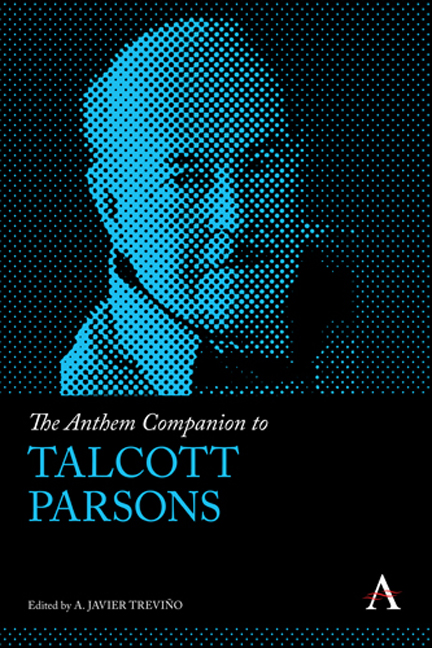Book contents
- Frontmatter
- Content
- Introduction
- Part I Political and Humanist Concerns
- Chapter One Fighting the Deadly Enemy of Democracy: Sociology against National Socialism
- Chapter Two Parsons's Critique of the Power Elite Thesis: Foundations for a Comprehensive Theory of Power
- Chapter Three The Expressive Revolution and the University: Parsons vs. Gouldner
- Chapter Four Parsons, Psychoanalysis and the Therapeutic Relationship
- Chapter Five Meanings of Life and Death: Insights of the Human Condition Paradigm
- Chapter Six Luhmann's Reception of Parsons
- Part II Social Evolution and the American Societal Community
- Contributors
- Index
Chapter Four - Parsons, Psychoanalysis and the Therapeutic Relationship
from Part I - Political and Humanist Concerns
Published online by Cambridge University Press: 22 July 2017
- Frontmatter
- Content
- Introduction
- Part I Political and Humanist Concerns
- Chapter One Fighting the Deadly Enemy of Democracy: Sociology against National Socialism
- Chapter Two Parsons's Critique of the Power Elite Thesis: Foundations for a Comprehensive Theory of Power
- Chapter Three The Expressive Revolution and the University: Parsons vs. Gouldner
- Chapter Four Parsons, Psychoanalysis and the Therapeutic Relationship
- Chapter Five Meanings of Life and Death: Insights of the Human Condition Paradigm
- Chapter Six Luhmann's Reception of Parsons
- Part II Social Evolution and the American Societal Community
- Contributors
- Index
Summary
Most serious students of Talcott Parsons's oeuvre are likely familiar with his writings on the personality system, his discussion of psychosomatic illness, his concept of the sick role or know of his enthusiasm for psychoanalysis—including the fact that he undertook formal didactic training at the Boston Psychoanalytic Institute. Yet to be rendered, however, is a comprehensive examination of these associated interests of his. Though Parsons's scholarly inquiry into the work of Freud—whose great achievement Parsons believed was seeing “the human person as a psychological entity operating as a self-regulating system”—extended throughout much of his career, no one has yet endeavored to explain Parsons's sustained theoretical and personal interest in psychoanalysis. I do not intend to undertake such an ambitious project; rather, my more modest and narrow objective in this chapter is to give a detailed examination of Parsons's sociological analysis of the therapeutic relationship in the context of psychoanalytic theory and practice. But before doing so, I briefly provide some sociohistorical background in which to generally situate his comments.
Psychoanalysis during the Postwar Period
Parsons's fascination with psychoanalysis was particularly acute during his most groundbreaking and theoretically productive years of 1945–60, a time when Freud's ideas enjoyed ascendency in various quarters of US society. Though there had been previous public interest in “the neurotic personality of our time,” the postwar period more fully produced the rise of “psychological man,” and psychoanalysis was frequently the preferred form of psychotherapy for the anxieties of the age. In popular culture, melodramas—such as Alfred Hitchcock's Spellbound (1945) and Vertigo (1958), Fritz Lang's Secret Beyond the Door (1948), the film noir Whirlpool (1949), the horror–thriller The Bad Seed (1956) and the critically acclaimed The Snake Pit (1948), as well as The Three Faces of Eve (1957) and Lizzie (1957)—with their psychobabble and direct or indirect references to guilt complexes, dream interpretation, the unconscious and other Freudian themes, captivated American audiences. Psychoanalytic depiction in film perhaps reached a crescendo with John Huston's biopic, Freud: The Secret Passion (1962) and Hitchcock's shocker Psycho (1960).
In social theory there emerged Marxian-informed and psychoanalytically inspired landmark works from main figures of the Frankfurt School including Theodor W. Adorno et al.'s The Authoritarian Personality, Erich Fromm's The Sane Society and Herbert Marcuse's Eros and Civilization.
- Type
- Chapter
- Information
- The Anthem Companion to Talcott Parsons , pp. 73 - 90Publisher: Anthem PressPrint publication year: 2016

